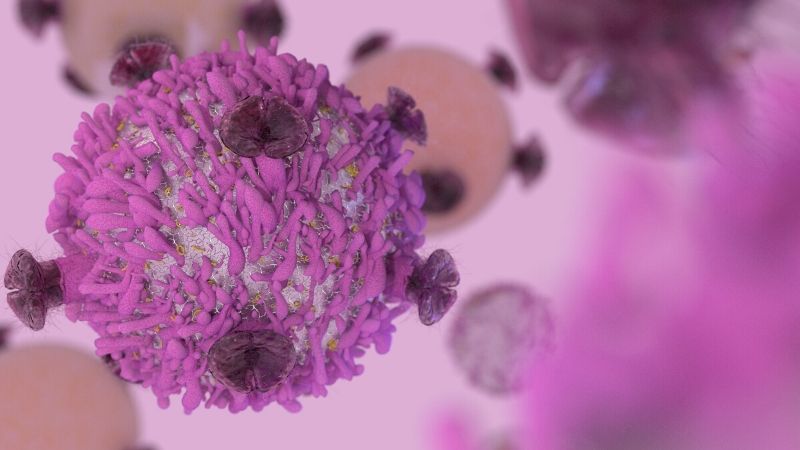This web page was produced as an assignment for an undergraduate course at Davidson College.
This study presents a proteogenomic analysis on breast cancer tumors to assert that current subtypes and classifications are incomplete and offers new molecular markers for future therapeutics.
Breast cancer tumors were first characterized by Perou, et al. (2000) in which 50 tumor transcripts were established for five subtypes. Though they are still used today for prognosis and therapies today, expression pattern assays are not readily available to all patients, and one out of three patients is still potentially misclassified (Johansson, et al. 2019). The new field of proteogenomics– the integration or effect of mutations on proteins produced– is a relatively new subset of genomics which has the potential to become a powerful tool for identifying new immunotherapies. This study implements proteogenomics to analyze 45 breast tumors by multiple systems of measurement to reveal new biomarkers, isolate difficult-to-classify patients, link protein presence to prognosis, and present all data in a comprehensive, online database.
Nine patients from the 50 original transcripts were chosen for this study to make sure tumor diversity was accurately represented. They identified six consensus core tumor clusters (CoTC) by analyzing specific proteins grouped by function within the 50 tumor transcripts. The CoTC groups were distinguished by differential expression of immune markers, protein targets, and protein enrichment. Based on new data gathered from proteins related to immune response, the researchers found that current data for the original transcripts of tumor types may be an incomplete classification.
The researchers also analyzed known drug targets from their new classifications to see if any new information was gleaned for new immunotherapies. For example, they found that a series of proteins and their abundances were highly correlated and may render tumors sensitive to simultaneous targeting by estrogen, testosterone, and androgen hormone receptor inhibitors. They also took a deeper look into an understudied class of tumor and found that two proteins working together may confer advantage to tumor survival, something that had not been found about this classification yet. Making sure patients are receiving the best, individualized treatment is crucial in knocking tumors down, and these new diagnostic methods provide fodder for therapeutic development (Johansson, et al. 2019).
Some proteins casually associated with cancer were found to not be a fully reliable link to prognosis. These proteins had a high level of mRNA expression (thought to link directly to protein production), but further studies found that some proteins should not be studied solely by mRNA expression as a final decision. Overall mRNA-protein correlations were found to be more varied than expected, and should be taken into account so as to lower the chance of a faulty prognosis.
The last part of the study looked into identifying tumor antigens, which are markers in the tumor that produce a host immune response. They are helpful in identifying tumors in diagnostic tests, and so this study aimed into the proteomic level. The researchers found tumor specificity in the breast of potential immunotherapeutic targets, which was different than the previously thought patient specificity (rather than tumor). They assert that identifying antigen targets in the proteome (at a protein level this time, not gene transcripts like previous studies), may streamline development of immunotherapies (Johansson, et al. 2019). Proteomic analysis of tumor antigens may be an incredibly helpful push towards individualized medicine in the future.
Overall, this study found that looking at proteomics inspires confidence and future work that identify better patient responses to targeted therapies. Internal new classification may help patients who will better respond to new immunotherapy, and cut down on receiving unhelpful or damaging chemotherapy. The researchers were able to better identify new and/or previously unknown, or mislabeled protein interactions as well as proteins within tumors as specific targets for immunotherapies. Proteogenomics is potentially a new, large contributor to further cancer analyses in the future and it will be exciting to look at what is to come. There are current, ongoing studies into other cancers, such as lung cancer (Gillette, et al. 2020), that have been published only within the last few years that begin to show the potential applications across molecularly unique cancers. The potential to integrate proteogenomics and precision medicine will help establish a more accurate design, prediction, and monitoring of therapeutic interventions for patients (Rodriguez and Pennington, 2018).
The researchers from this study compiled their data and findings into a user-friendly and easily accessible data portal (Johansson, et al. 2019) for anyone to look through: www.breastcancerlandscape.org.
Sophie Byers is a Bio major at Davidson College in Davidson, NC. Contact her at sobyers@davidson.edu.
© Copyright 2021 Department of Biology, Davidson College, Davidson, NC 28035
Link back to home page: here
REFERENCES
Gillette, Michael A., Shankha S., Song C., Dhanasekaran S., Vasaikar S. et al. “Proteogenomic Characterization Reveals Therapeutic Vulnerabilities in Lung Adenocarcinoma.” Cell, Cell Press, 9 July 2020, www.sciencedirect.com/science/article/pii/S0092867420307443.
Hernandez-Valladares M, Vaudel M, Selheim F, Berven F, Bruserud Ø. Proteogenomics approaches for studying cancer biology and their potential in the identification of acute myeloid leukemia biomarkers. Expert Rev Proteomics. 2017 Aug;14(8):649-663. doi: 10.1080/14789450.2017.1352474. Epub 2017 Jul 27. PMID: 28693350.
Johansson, H.J., Socciarelli, F., Vacanti, N.M. et al. Breast cancer quantitative proteome and proteogenomic landscape. Nat Commun 10, 1600 (2019). https://doi.org/10.1038/s41467-019-09018-y
Perou C.M., Sørlie T., Eisen M.B., van de Rijn M., Jeffrey S.S., Botstein D. et al. Molecular portraits of human breast tumours. Nature. 2000 Aug 17;406(6797):747-52. doi: 10.1038/35021093. PMID: 10963602.
Rodriguez, Henry, and Stephen R Pennington. “Revolutionizing Precision Oncology through Collaborative Proteogenomics and Data Sharing.” Cell vol. 173,3 (2018): 535-539. doi:10.1016/j.cell.2018.04.008
